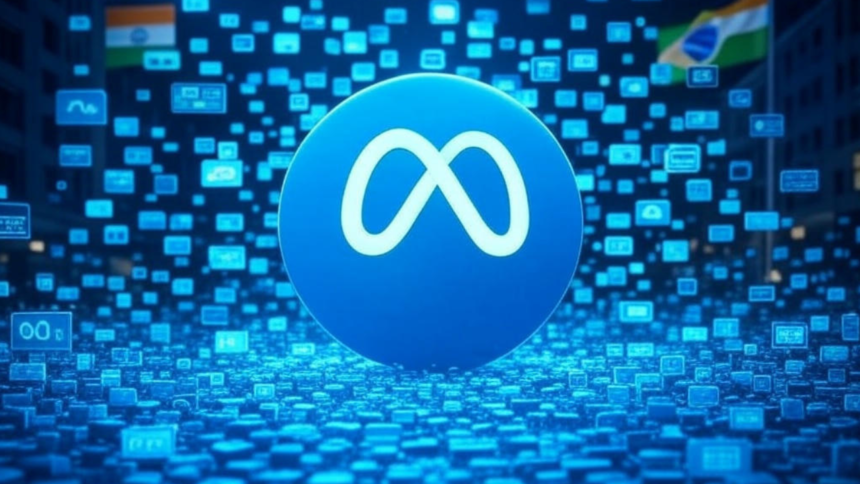In March 2025, Meta, the parent company of Facebook, executed a significant crackdown, removing over 23,000 Facebook Pages and accounts primarily targeting users in India and Brazil. This large-scale cleanup was driven by the company’s ongoing efforts to combat scam activities proliferating on its platform, particularly those leveraging advanced technologies like deepfakes to deceive users. The operation underscores Meta’s commitment to enhancing user safety and maintaining platform integrity, while also highlighting the evolving challenges of policing digital spaces in an era of sophisticated online fraud.
The Scam Epidemic: How Fraudsters Operated
The deleted accounts and Pages were part of coordinated scam networks that exploited Facebook’s vast reach to target vulnerable users in India and Brazil. According to Meta, scammers employed a range of deceptive tactics, with deepfake technology being a prominent tool. These fraudsters created convincing but fake videos and images impersonating well-known figures, such as personal finance influencers, cricket players, and business leaders popular in these countries. By mimicking trusted personalities, the scammers lent credibility to their schemes, which often promoted fraudulent investment apps and gambling websites.
The modus operandi was calculated and multi-layered. Scammers used Facebook to initiate contact, posting content that lured users with promises of quick financial gains or exclusive opportunities. From there, victims were redirected to messaging apps like WhatsApp for personalized “investment advice” or to fake websites designed to resemble legitimate platforms, such as a counterfeit Google Play Store. These sites tricked users into downloading malicious apps that could compromise personal data or facilitate financial fraud. The scale of these operations, with over 23,000 accounts involved, indicates a highly organized effort to exploit Meta’s platforms for illicit gain.
Meta’s Response: Swift Action and Broader Strategy
Meta’s removal of these accounts in March 2025 reflects its proactive stance against online scams. The company identified and dismantled multiple clusters of scam activity, leveraging advanced detection systems to flag inauthentic behavior. This cleanup is part of Meta’s broader strategy to comply with regional regulations, such as India’s IT Rules 2021, which mandate social media platforms with significant user bases to publish monthly compliance reports and take action against policy violations.
Beyond account deletions, Meta has intensified efforts to educate users about scam awareness. The company has shared insights into common scam tactics and provided practical tips to help users identify red flags, such as unsolicited investment offers or suspicious links. By combining enforcement with education, Meta aims to empower its global user base to navigate the platform safely.
The Bigger Picture: Challenges in Content Moderation
The cleanup operation, while significant, highlights the persistent challenges Meta faces in moderating content across its platforms. India and Brazil, with their large and diverse user populations, are prime targets for scammers due to the potential for widespread impact. The use of deepfakes adds a layer of complexity, as these AI-generated fakes are increasingly difficult to detect without sophisticated tools. Meta’s reliance on automated systems, while effective in catching many violations, struggles with contextual nuances, particularly in regions with varied cultural and linguistic landscapes.
This operation also comes amid broader scrutiny of Meta’s content moderation policies. In early 2025, the company faced backlash for scaling back third-party fact-checking, prompting a surge in user searches for how to delete Facebook and Instagram accounts. Critics argued that reduced oversight could exacerbate misinformation and scams, a concern that Meta’s latest action indirectly addresses by targeting fraudulent accounts. However, the sheer volume of deleted accounts—over 23,000 in this instance—suggests that scam networks remain a formidable challenge.
Looking Ahead: Strengthening Digital Trust
Meta’s deletion of over 23,000 accounts in India and Brazil is a step toward curbing online fraud, but it’s not a complete solution. The company must continue to innovate its detection technologies, particularly to counter AI-driven scams like deepfakes. Collaboration with local authorities and tech partners in high-risk regions like India and Brazil could further enhance its ability to disrupt scam networks before they reach users.
For users, the takeaway is clear: vigilance is essential. Meta’s scam awareness initiatives encourage skepticism toward unsolicited offers and verification of sources before engaging with financial opportunities online. As digital platforms evolve, so too must the strategies to protect their users.
This cleanup serves as a reminder of the delicate balance between fostering open communication and safeguarding against exploitation. While Meta’s actions demonstrate resolve, the fight against online scams is far from over.



